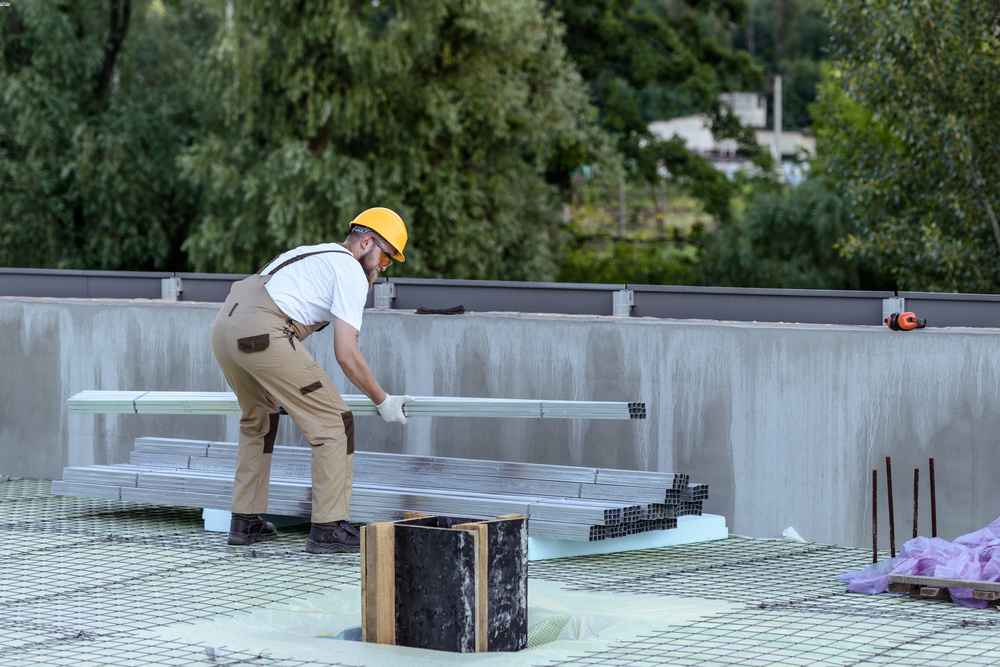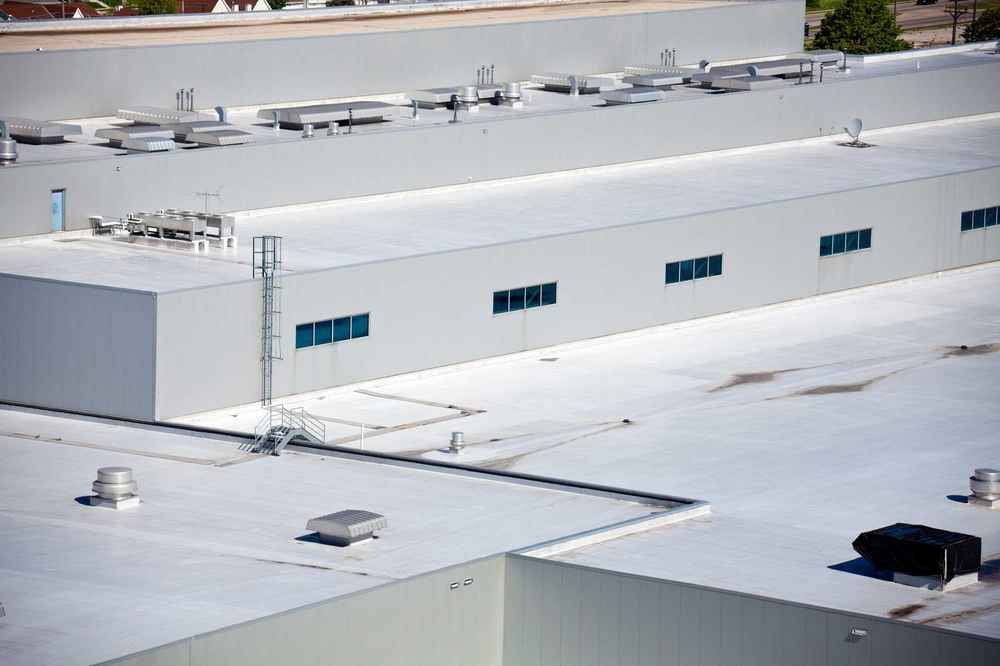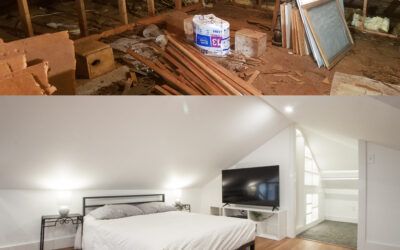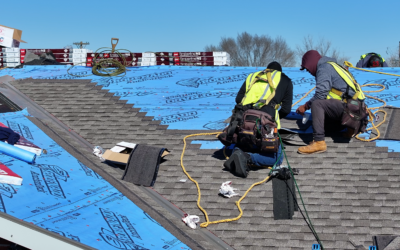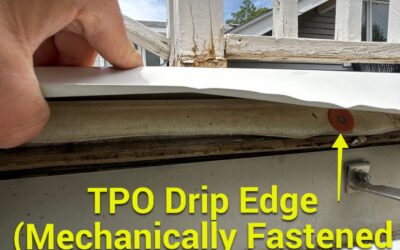Commercial roofing projects aren’t fun. For you, the property manager, it’s another plate to spin — permits, budgets, timelines. For your tenants? It’s noise, dust, restricted access, and “What The truth is, most roofing contractors don’t prepare you for the part that matters just as much as materials and warranties: communicating with your tenants.
We’re Rhoden Roofing LLC—and we’ve helped hundreds of commercial property owners across Wichita get through major roofing projects without ticking off half the building. We’re going to show you exactly how to notify tenants about a roofing project like a pro—not a rookie.
If you want to reduce tenant complaints, stay OSHA-compliant, and make it through your next project without babysitting your contractor or cleaning up communication messes… read this. Save it. Bookmark it.
Here’s What You’ll Learn:
- How to prep BEFORE sending a single tenant email
- What goes in a solid tenant notification
- How to reduce roof replacement noise complaints
- What most roofing companies miss in their safety plans
- How Rhoden Roofing handles all of the above — so you don’t have to
Want a contractor who makes your job easier — not harder? Rhoden Roofing LLC can help.
Why Tenant Communication Makes or Breaks Your Roofing Project
You might think, “It’s just a roof—why do I need to make a big deal out of this?”
Because your tenants don’t care that it’s just the roof. They care about:
- Parking that disappears overnight
- Drills ruining phone calls or client meetings
- Blocked entrances during business hours
- HVAC outages that nobody warned them about
Here’s the truth: Poor communication costs you money. It creates angry tenants, negative reviews, and lease churn.
We’ve seen it all—and we’ve helped property managers avoid all of it.
At Rhoden Roofing, every project includes a custom commercial roofing safety plan and support with tenant communication. Why? Because it’s not just about the roof. It’s about keeping your building functional while the work gets done.
What to Know Before You Notify Tenants About Roofing Work
Before you send any notices or post signs, you need to know exactly what the roofing project involves—and how it affects tenants. This section breaks it down.
Understand the Scope of the Commercial Roofing Project
You need to know if it’s a small repair, partial replacement, or full tear-off. Here’s what to clarify:
- Is the project a full roof replacement or a targeted commercial roof repair?
- What type of roofing system is being installed (TPO, PVC, metal, tile)?
- How long will it take—and what parts of the property are impacted?
Different materials bring different challenges:
- TPO/PVC: Possible adhesive odors
- Metal: High-volume fastening noise
- Tile/slate: Longer project timeline with heavy equipment on-site
Map out which parts of the property will be off-limits or rerouted. Tenants can’t plan if they don’t know where they’ll be impacted.
Check Your Lease Agreements and Local Permit Requirements
This is where many property managers slip up—don’t forget to:
- Review your leases. Many require 7–14 days’ written notice before starting disruptive work.
- Check for clauses about construction hours or noise restrictions—especially for clinics, law offices, or salons.
- Confirm if permits are needed. In Wichita, most full commercial roofing projects do require city permits and inspections.
Failing to notify tenants properly can violate lease terms or delay inspections—two problems you don’t want mid-project.
Confirm the Roofing Project Schedule
Vague timelines cause problems. Lock down the details:
- Start and end dates
- Daily work hours (Is this an 8–5 job? Weekends?)
- Contingency days for Kansas weather
Most importantly, break the schedule down by impact:
- When will roof replacement noise be worst?
- When will odors be noticeable (if adhesives are involved)?
- Which entrances or parking areas are affected and when?
Tenants can handle inconvenience—if they know it’s coming.
Identify How the Work Will Affect Tenants Day-to-Day
This is the part most contractors won’t tell you. You need to know:
- Will tenants smell adhesives or sealants?
- Will HVAC be shut off during rooftop unit work?
- Are elevators, stairs, or walkways affected?
If your contractor can’t answer these questions clearly, you’ll be the one fielding angry calls.
At Rhoden Roofing, we walk you through this before we start—so you’re prepared and tenants aren’t caught off guard.
Get a Commercial Roofing Safety Plan in Writing
You can’t wing safety. You need a clear, enforceable commercial roofing safety plan that covers:
- Dumpster and material staging areas
- Fencing, cones, and signage for pedestrian routing
- How you’ll protect cars, walkways, and entrances
- Daily cleanup protocols
We deliver a full jobsite map and safety plan for every commercial project we do. Not because it’s flashy—because it’s required, and it works.
How to Notify Tenants the Right Way (Step-by-Step)
Once you’ve got the logistics figured out, it’s time to communicate. Here’s how to do it right.
1. Draft a Clear, Simple Tenant Notification Letter
Keep it straightforward. Include:
- Start and end dates
- Daily working hours
- What parts of the building will be affected
- When tenants can expect noise, smells, or access issues
- Who to contact with questions or concerns
Don’t include roofing jargon. Stick to facts that matter to tenants.
2. Deliver the Notice Multiple Ways
One email isn’t enough. We recommend:
- Email announcements
- Flyers on unit doors or front desks
- Signage in elevators, lobbies, and entrances
- Updates in tenant portals or group chats (if applicable)
3. Notify Tenants Early—Ideally 10–14 Days Before Work Starts
This is the sweet spot. Less than a week and you’ll get complaints. More than two weeks and people forget. For emergency commercial roof repairs, communicate as early as possible—even if the project starts the next day.
4. Provide Brief Updates During the Project
Most problems happen when tenants are caught off guard.
Send simple updates like:
- “Crane lift scheduled Thursday—rear lot closed 8–11 AM.”
- “Loud tear-off scheduled tomorrow from 9–12.”
- “Roofing complete over Unit 205—HVAC back online by 5 PM.”
These take 30 seconds and save you hours of complaint calls.
Want a deeper dive into tenant-friendly project planning? Read our follow-up guide: The Commercial Property Owner’s Playbook: Roofing Without Losing Tenants.
Pros and Cons of Tenant Notification Methods
There’s no perfect way to notify tenants. But depending on your building, your tenant mix, and how much time you have before starting the project, some methods will work better than others. Here’s a breakdown to help you choose what’s right for your situation.

Our recommendation: Combine methods. Use email + flyers + signage for the best coverage. And for high-priority tenants (medical, retail, long-term leases), go the extra mile with personal contact.
How Rhoden Roofing LLC Helps You Keep Tenants Informed
You shouldn’t have to manage a contractor and do tenant PR. That’s why we build this into every commercial job we take on.
Communication Templates and Signage
We give you tenant notices, email templates, and signage you can copy, paste, and use immediately. No guessing. No legal gray areas.
Permit, Code, and Lease Coordination
We work with the City of Wichita, your legal team, and your lease obligations—so your job is easier, not harder.
Noise and Odor Planning
We schedule noisy work around your tenants’ hours when possible. We warn you ahead of time when odor-producing materials are needed. No surprises.
Real Jobsite Safety Plans
We give you site-specific safety plans with:
- Dumpster locations
- Traffic and pedestrian control
- Material staging maps
- Tenant routing during construction
Wichita Commercial Roofing FAQs: What Property Managers Need to Know
If you’re planning a roofing project on a multi-tenant commercial property, you probably have a few questions — and your tenants likely will too. Here are some of the most common questions we get from Wichita property managers during commercial roofing projects, along with straight, no-fluff answers.
How much notice do I need to give tenants before a roofing project?
You need to give tenants at least 10 to 14 days’ notice before starting a commercial roofing project. This gives them time to adjust operations, reschedule deliveries, or plan for any disruptions. If the project is an emergency repair, notify tenants as early as possible and explain why the timeline is shortened.
How disruptive will roof replacement noise be for tenants?
Roof replacement noise will be disruptive during specific phases of the project, especially during tear-off, mechanical fastening, or heavy equipment use. That’s why we work with you to schedule the loudest activities during off-hours whenever possible, and we always give advance notice to help tenants prepare.
Will tenants still have access to the building during roofing work?
Yes, tenants will still have access to the building during most commercial roofing projects. However, certain entrances, stairwells, or parking areas may be temporarily restricted for safety. Our team provides clear signage and routing to ensure minimal disruption to normal building operations.
Do I need a commercial roofing safety plan in place?
Yes, you absolutely need a commercial roofing safety plan in place before any work begins. OSHA requires it, and it helps protect both workers and tenants. At Rhoden Roofing LLC, we develop a site-specific safety plan for every project, including fencing, signage, access control, and cleanup procedures.
Can Rhoden Roofing help notify my tenants?
Yes, Rhoden Roofing can help notify your tenants. We provide pre-written notification templates, safety signage, and project updates that make it easy to keep tenants informed and satisfied throughout the process.
Do you handle permits and inspections in Wichita?
Yes, we handle all required permits and inspections as part of our commercial roofing service. We coordinate directly with local building officials in Wichita to ensure your project stays compliant and on schedule—so you don’t have to deal with the red tape.
Do I need to be on-site during the roofing project?
No, you don’t need to be on-site during the roofing project, but it’s helpful to stay available for questions or tenant concerns. We handle daily coordination, safety checks, and site management. We’ll keep you updated throughout the job, so you can focus on your property—not babysitting the roof crew.
Final Takeaway: Communicate Early, Execute Clean, and Keep Everyone Happy
If you’re serious about keeping tenants happy during a roofing project, start with a plan. Get the facts. Communicate clearly. And hire a contractor who actually understands commercial properties—not just shingles and flat roof systems.
At Rhoden Roofing LLC, we’ve helped Wichita property managers complete hundreds of commercial roofing projects—without losing tenants, business hours, or sleep.
Schedule your free inspection today and let’s make your next project the smoothest one yet.

